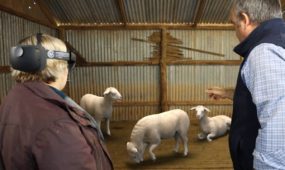Online entertainment's age of enlightenment
Technology
Peepable were recently named Australia’s coolest company by Anthill Online. When asked why, co-founders Alex French and Nari Jennings make it seem like the answer is obvious: “Well, it’s a really cool idea.”

Sign up to receive notifications about new stories in this category.
Thank you for subscribing to story notifications.
Peepable were recently named Australia's coolest company by Anthill Online. When asked why, co-founders Alex French and Nari Jennings make it seem like the answer is obvious: “Well, it's a really cool idea.”
They're the South Australian team behind The Captioning Studio, a teaming of technology and talented people that grant accessibility to people living with disability.
Their latest tech is a take on 'granular' search – that is, breaking a big piece of information down in to small ones and picking out the relevant parts. In this case, it's the spoken word within a video.
“When it comes to searching for video, we're still in the dark ages. We can do so much more to make video accessible and discoverable to everyone. We've expanded the idea from there,” says Nari Jennings.
“This has never really been done before.”
Jennings compares it to a typical Google search. Imagine if you could only search for web pages by their meta-tags, descriptions and titles.
“Oh, and by the way,” Alex French adds, “imagine you found that page and you can't just control-F to search for the text you were looking for – you had to read the whole thing and it's about 40 A4 pages long. That's where we're at right now with video.”
Instead, Peepable lets users grab segments out of a video. They could search for ingredients in a recipe and bring up a YouTube tutorial, lyrics of a song, or the contents of a lecture they saw.
When it comes to searching for video, we're still in the dark ages. This has never really been done before.
Peepable brings up each video as a 'Peep'. The entire timeline of a video is displayed, but the small segment a user searched for is clipped out. They can drag the clip to expand or shrink it to the right place and length, and then share their Peep over social media.
“Sharing is a big part. The thing about today is that nobody has the time to watch a whole video. We're interested in particular fragments and segments. You're able to get right to the point you're looking for and then share that small snippet. It's like Twitter – short,” Jennings says.
A user could be about to leave work when another task comes up – they could search for “Just when I thought I was out”, part of a quote from The Godfather Part III. Peepable would load up a Peep of the whole video. Then they could drag it to fit the whole quote: “Just when I thought I was out, they pull me back in!” One click later, and the clip is shared with their friends on Facebook or Twitter.
The idea for Peepable came out of pure frustration, French explains.
“We'd go to a conference and they'd sell sets of DVDs or audio recordings. You look at it and there's 12 DVDs and they're all over an hour long. Far out, I'm never going to watch that – but actually, there's some info on there from the middle of the weekend I'd love to have – there's just no way I'll ever find it again,” French says.
Some of the technology that goes in to Peepable originated from techniques The Captioning Studio was using to automate transcript captioning. A few of those concepts applied to making video searchable, as well.
Their Go Theatrical! app and live captioning capabilities were revolutionary in their own right – they allow hearing and vision impaired people to do what most of us take for granted – go to the theatre, get a fair education. That work won them the Human Rights Commission's Business Award and the National Disability Award.
Our whole aim for this is to ultimately make anything across the net searchable
But Peepable is on another scale altogether.
“Our whole aim for this is to ultimately take – I won't say all the videos from the Internet – but anything with spoken word, and make anything across the net searchable,” French says.
While they're not expecting to launch on day one with the entire web's worth of video ready to search, there will be a lot of content. Peepable will aggregate content from YouTube, TED, media websites and more. Users will also be able to search in multiple languages.
“We should clarify,” Jennings says, “it's there. It's not a challenge in terms of being able to do it. We've done it. But the hosting is very, very expensive, so as we continue fundraising, you'll see the size increase.”
Their early crawls of the Internet's vast range of videos resulted in very large numbers with a lot of zeroes on the end. The infrastructure required to host that amount of data is fairly ridiculous for a startup – so their first focus is on making sure Peepable provides good performance and a good user experience before building up their funding and scaling their systems.
When they do, the company should be well equipped to handle it. Already on the team is former MySpace Engineer Jason Eacott, more than used to dealing with massive amounts of data.
Software Engineer Rod Mitchell from Motorola, Hewlett Packard and Thales is handling the machine learning and search relevance. Frank Falco, former Director and CIO of Internode also recently joined them as Architecture and Operations Advisor.
“They're some of the reasons that I'm confident we can do it,” French says.
Prospects for monetisation are solid as well. Unlike YouTube, Peepable sends the user to the content publisher's site. It drives traffic, but is totally platform agnostic.
“That's the difference if you're a publisher. At the moment you have to upload all your content to YouTube in order to be discovered,” Jennings says.
“Everyone we talk to,” French adds, “whether they're an international broadcaster or a university or a content marketer, they always say they have amazing video content and they're trying to get it discovered. They're just not really sure how. This is a way of getting more traffic.”
On top of filling the need for more traffic, Peepable also delivers better user engagement and also in-depth analytics – such as heat maps of videos, showing which parts people are most commonly watching and sharing.
“Right now we're having some great discussions with publishers, walking in and within 20 or 30 minutes hearing them say that it would definitely help them, and that they'd be happy to pay for it,” French says.
Their next step is the beta release of Peepable. They had a demo version ready to go, but there are a few tweaks before they start to release it for public use.
“In terms of the beta version,” Jennings says, “we're looking at how people are going to use it, how often they're using it, why they're using it. We've got these ideas on how to monetise it, but it depends on the results of the beta.”
2014 was a good year for Peepable – they were at the Global Cafe as part of the G20 summit, they were featured as one of the 23 companies at Tech23 and, finally, named Australia's coolest company.
“It's an interesting journey,” French says. “You go from highs to lows as a startup and there's always another challenge that you find. It's a fun journey you go through.”
2015 is all about growth – and the release of their beta, which users can sign up for ahead of time at Peepable's website.
And the beta release?
“Imminent. Very, very close,” Jennings says.
Jump to next article



